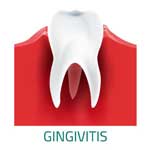
Gingivitis: Symptoms, Causes, & Treatment
The main cause of gingivitis is dental plaque. If not removed regularly, plaque can accumulate between your teeth and around the gums, causing redness, swelling, and sometimes bleeding.
Helping prevent and treat gingivitis at home is possible if you adopt a thorough and consistent oral hygiene regimen. Adding a WATERPIK water flosser to your daily routine is one of the most effective methods for removing plaque and debris that brushing and string flossing miss. It's an easy, at-home gingivitis treatment.
Gingivitis Symptoms
It's especially important to watch for signs of gingivitis because untreated gingivitis can become periodontitis, a more serious gum disease that causes gum recession and eventually tooth and bone loss.
Gingivitis generally does not cause pain on its own, but it can cause gum tenderness and other unpleasant physical symptoms, such as these:
- Swollen or spongy gums
- Red coloration of the gums
- Bleeding of the gums (which can happen during routine brushing)
- Bad breath
Gingivitis may only affect a small area of the mouth in the early stages. If allowed to progress, gingivitis can affect the entire mouth.
Early intervention is important, so if you suspect gingivitis is present, make an appointment with your dentist as soon as possible. They can help you with an at-home plan to resolve your gingivitis.
What Causes Gingivitis?
The leading cause of gingivitis is poor oral hygiene which leads to plaque formation. Plaque is teeming with bacteria and needs to be removed frequently. Otherwise, plaque is likely to harden and become tartar. Removing tartar requires the expertise of your dental professional.
Plaque
Plaque tends to form along the gumline and between teeth, areas where traditional brushing and string flossing miss. If plaque and tartar stay in place long enough, they can irritate and eventually inflame your gums. That inflammation is gingivitis.
While gingivitis is caused by plaque and subsequent tartar, other factors like diabetes and dry mouth may also increase your risk.
Treating Gingivitis
Many people wonder if gingivitis is reversible. The good news is that by consulting your dentist and adopting a better at-home oral care routine, you can slow, halt, or even reverse the condition.
Daily Brushing & Flossing
All successful oral care routines incorporate both daily brushing and string flossing. Adding a WATERPIK water flosser will elevate your regimen.
The WATERPIK water flosser delivers an effective and invigorating clean with warm pulsating water. It thoroughly cleans all areas of the mouth, including hard-to-reach areas like the back teeth and under the gumline.
Clinical research shows that the WATERPIK water flosser is proven up to 2X as effective as string floss for removing bacterial plaque and improving gum health. It also removes up to 99.9% of plaque bacteria that causes gingivitis, cavities, and bad breath from treated areas.
Preventable & Treatable
Gingivitis is unfortunately common but the good news is that it's easily preventable and treatable, and it doesn't take long for gums to heal. The sooner you take action, the better your chances of preventing damage and the progression of more serious gum disease.


